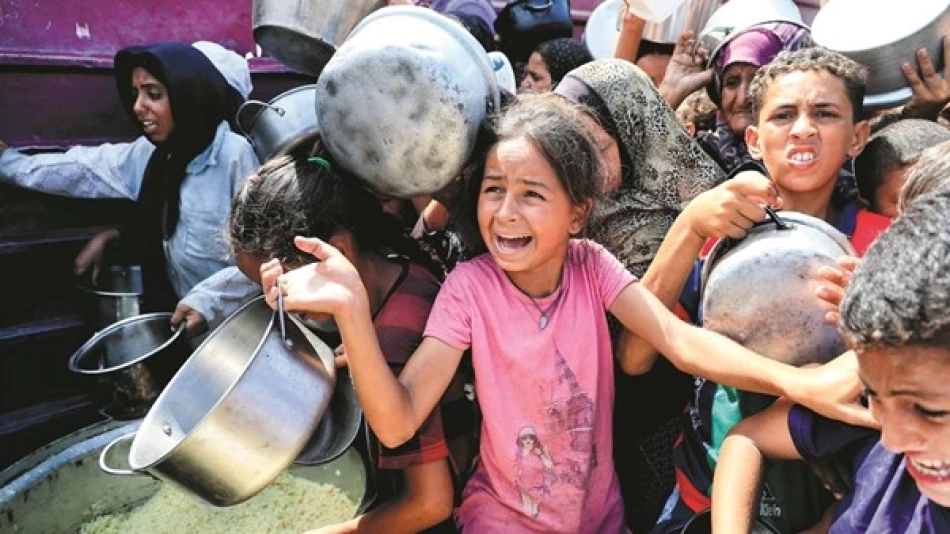
UN Declares Famine Crisis Gripping Gaza: Humanitarian Disaster Unfolding
UN Declares First-Ever Famine in Middle East as Gaza Crisis Reaches Catastrophic Levels
The United Nations has officially declared famine conditions in Gaza, marking the first such declaration in Middle Eastern history as 500,000 Palestinians face what experts classify as "catastrophic hunger." The announcement represents a watershed moment in the region's humanitarian crisis, with UN officials directly attributing the disaster to systematic obstruction of food aid rather than natural causes.
Historic Declaration Signals Unprecedented Crisis
Friday's famine declaration by the UN carries profound significance beyond its immediate humanitarian implications. Never before has the Middle East—a region that has witnessed decades of conflict—required such a designation. The Integrated Food Security Phase Classification (IPC), the global standard for assessing food crises, issued the dire assessment after months of deteriorating conditions in the Palestinian territory.
Tom Fletcher, UN Under-Secretary-General for Humanitarian Affairs, delivered a scathing assessment, stating that the famine was "entirely preventable" and resulted from Israel's "systematic obstruction" of food aid deliveries. This direct attribution of responsibility marks an unusually pointed stance from the typically diplomatic UN apparatus.
Understanding Famine Classifications and Their Implications
What Catastrophic Hunger Means
The IPC's classification system ranges from Phase 1 (minimal food insecurity) to Phase 5 (catastrophic/famine conditions). When 500,000 people reach Phase 5, it indicates widespread starvation, acute malnutrition, and imminent risk of death. Historical precedents include Somalia (2011), South Sudan (2017), and parts of Yemen during its ongoing crisis.
Unlike previous famines driven primarily by drought, conflict displacement, or economic collapse, Gaza's situation stems from what UN officials characterize as deliberate restrictions on humanitarian access—a distinction that carries significant legal and political ramifications.
International Legal and Political Ramifications
War Crimes Allegations Surface
UN High Commissioner for Human Rights Volker Türk's statement that "starving people for military purposes constitutes a war crime" elevates the crisis beyond humanitarian concern into the realm of international criminal law. This assessment aligns with Rome Statute provisions that classify deliberately starving civilians as a war crime in both international and non-international armed conflicts.
Secretary-General António Guterres' declaration that "we cannot allow this situation to continue with impunity" suggests potential referrals to international judicial bodies, though enforcement mechanisms remain limited given existing geopolitical constraints.
Regional and Global Implications
Middle Eastern Humanitarian Precedent
The famine declaration sets a troubling precedent for the region, potentially influencing how future conflicts are conducted and humanitarian access is negotiated. Regional powers, particularly those involved in proxy conflicts across Syria, Yemen, and Lebanon, now face increased scrutiny over their own humanitarian policies.
International Aid Architecture Under Pressure
The crisis exposes fundamental weaknesses in the international humanitarian system when access depends on the cooperation of conflicting parties. Unlike natural disasters where aid delivery faces logistical challenges, Gaza's situation demonstrates how political obstruction can render traditional humanitarian responses ineffective.
The declaration will likely prompt donor countries to reassess their aid delivery mechanisms and potentially explore more assertive approaches to ensuring humanitarian access, including possible airdrops or maritime corridors despite security risks.
Looking Forward: Accountability and Prevention
The Gaza famine declaration represents more than a humanitarian milestone—it constitutes a test case for international law enforcement and the global community's commitment to preventing mass atrocities. With half a million people facing starvation in a geographically contained area under international observation, the crisis offers no refuge in claims of ignorance or inaccessibility that have historically complicated famine responses in remote regions.
The unprecedented nature of this Middle Eastern famine, combined with its attributed causes, will likely influence future humanitarian law development and potentially reshape how the international community responds to conflict-related food crises globally.
Most Viewed News

 Layla Al Mansoori
Layla Al Mansoori






